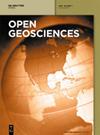Petrogenetic relationship between plutonic and subvolcanic rocks in the Jurassic Shuikoushan complex, South China
IF 1.7
4区 地球科学
Q3 GEOSCIENCES, MULTIDISCIPLINARY
引用次数: 0
Abstract
There has been a longstanding debate on whether plutonic and subvolcanic rocks have a petrogenetic connection, and the Jurassic Shuikoushan caldera complex in South China serves as an ideal case study for unraveling this geological puzzle. SIMS U–Pb dating of zircon indicates the formation age of plutonic (granodiorite) and subvolcanic rocks (dacite porphyry and rhyolite porphyry) from the Shuikoushan caldera complex at华南侏罗纪水口山岩群中的深成岩与次火山岩之间的岩石成因关系
关于深成岩和亚火山岩是否存在成岩关系的争论由来已久,华南侏罗纪水口山火山口群是解开这一地质难题的理想案例。锆石的SIMS U-Pb年代测定表明,水口山火山口群的柱状岩(花岗闪长岩)和亚火山岩(英安岩斑岩和流纹斑岩)的形成年龄约为159Ma。在地球化学成分方面,花岗闪长岩和黑云母斑岩的氧化镁(1.98-3.63%)、氧化锰(0.07-0.11%)、氧化铁(5.12-6.15%)、锶(342-547 ppm)和钡(754-1200 ppm)含量均高于流纹斑岩。相反,它们显示出较低的铷浓度(2.04-27.1 ppm),以及较低的铷/锶(0.004-0.055)和铷/钡(0.004-0.023)比率。在水口山火山口群中,这些岩石类型之间截然不同但又互补的地球化学特征十分明显。总体而言,三种岩石类型的锆石颗粒都表现出相似的负ε Hf(t)值(-8.1至-12.4)和高δ 18O值(8.3至9.7‰),这表明它们有一个共同的来源区域。根据岩性和地球化学证据,推测流纹斑岩是从蘑菇储层中提取的熔体。与此相反,花岗闪长岩和黑云母斑岩是富含积云的残余熔体。这一解释支持了这样一种观点,即晶体-熔体分离过程是连接水口山岩群中晚侏罗世次火山岩和深成岩的关键。
本文章由计算机程序翻译,如有差异,请以英文原文为准。
求助全文
约1分钟内获得全文
求助全文
来源期刊

Open Geosciences
GEOSCIENCES, MULTIDISCIPLINARY-
CiteScore
3.10
自引率
10.00%
发文量
63
审稿时长
15 weeks
期刊介绍:
Open Geosciences (formerly Central European Journal of Geosciences - CEJG) is an open access, peer-reviewed journal publishing original research results from all fields of Earth Sciences such as: Atmospheric Sciences, Geology, Geophysics, Geography, Oceanography and Hydrology, Glaciology, Speleology, Volcanology, Soil Science, Palaeoecology, Geotourism, Geoinformatics, Geostatistics.
 求助内容:
求助内容: 应助结果提醒方式:
应助结果提醒方式:


